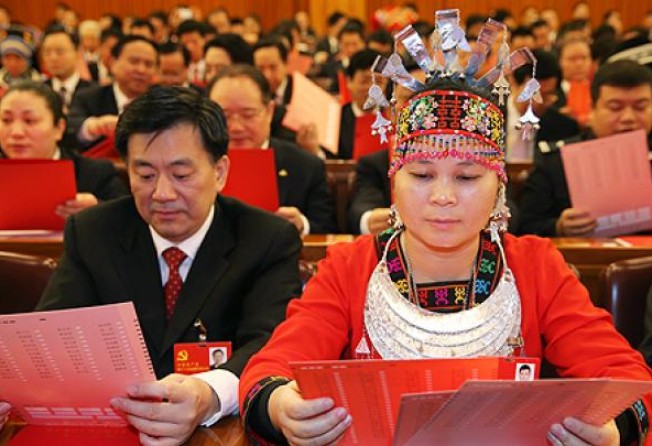Central Committee vote belies much touted intra-party democracy
Number of Central Committee candidates now matches number of seats

The level of competition in preliminary voting for the elite Central Committee turned out to be lower than expected, dealing another embarrassing blow to the Communist Party's much touted internal democracy.
The formal vote to be held today at the concluding session of the week-long party congress will not be competitive, analysts said, meaning that the number of candidates will match the number of seats available.
Xinhua said at least 8 per cent of nominees were eliminated in the first-round elections for membership and alternate membership (stand-ins in the event a member has to be replaced) of the Central Committee and membership of the Central Commission for Discipline Inspection, the party's top anti-corruption agency.
Official media have been tight-lipped on the exact size of the new Central Committee, but Gansu party congress delegate Wang Dong revealed late yesterday that 205 of 224 candidates had been shortlisted in the first round, meaning 9.3 per cent were eliminated.
That marks little improvement from the previous party congress five years ago, at which 8.3 per cent were eliminated in early voting.
Several other delegates also said 19 candidates had been eliminated in primary elections held on Sunday and Monday. That compared with 17 in 2007.
The two-stage practice is a compromise designed to give congress delegates some freedom to vote while at the same time making sure the result of the formal vote is predetermined.
Despite widespread speculation that party general secretary Hu Jintao may have wanted to promote his own brand of democracy - so-called "intra-party democracy" - by making the preliminary polls more competitive, analysts said he had once again failed to live up to public expectations.
Hong Kong-based analyst Johnny Lau Yui-siu said the results laid bare the leadership's reluctance to push for meaningful political reform.
"It basically disappoints everyone who still had hopes for the top-down approach to intra-party democracy," he said.
He said the fact that Xinhua's report yesterday did not mention the exact percentage of nominees eliminated showed the leadership did not have much to show off about.
"If we look at the 13th party congress 25 years ago, when the idea of electoral competition was first introduced with [5 per cent more candidates than seats on] the Central Committee, we'll see the talk of intra-party democracy is nothing but deception," Lau said.
Professor Zhu Lijia, from the Chinese Academy of Governance in Beijing, warned the party had missed yet another opportunity for bolder reform, which an increasingly impatient public is demanding.
"The marginal progress is far from enough to reinitiate meaningful political reform, which has been stalled for over a decade under Hu's leadership," he said.
Beijing-based analyst Chen Ziming also weighed in. "As long as the so-called elections are not subject to public scrutiny, intra-party democracy remains an empty promise," he said.
Xinhua said the congress' 247-member presidium met for the third and last time yesterday and approved the number and names of candidates for today's final ballot.